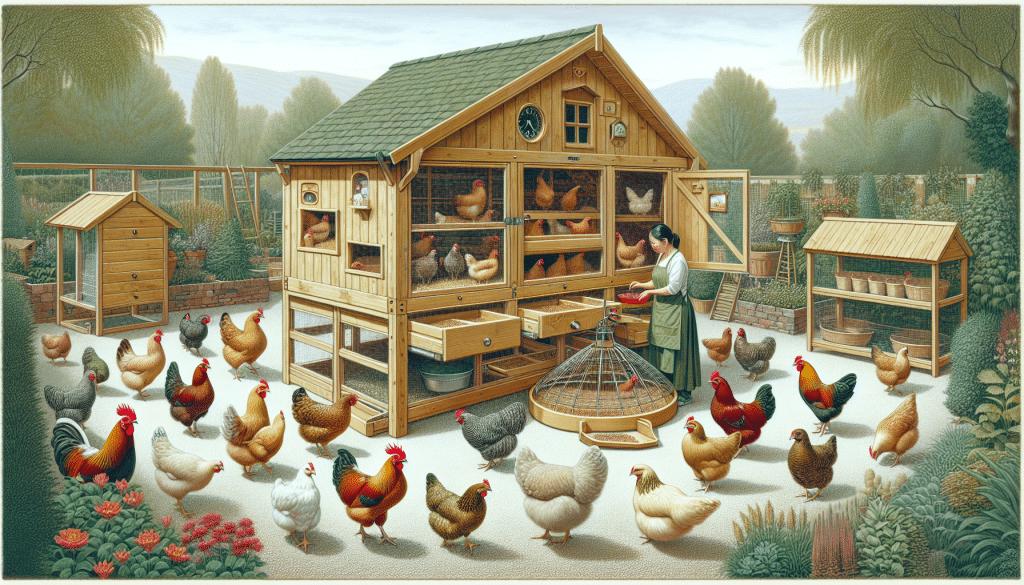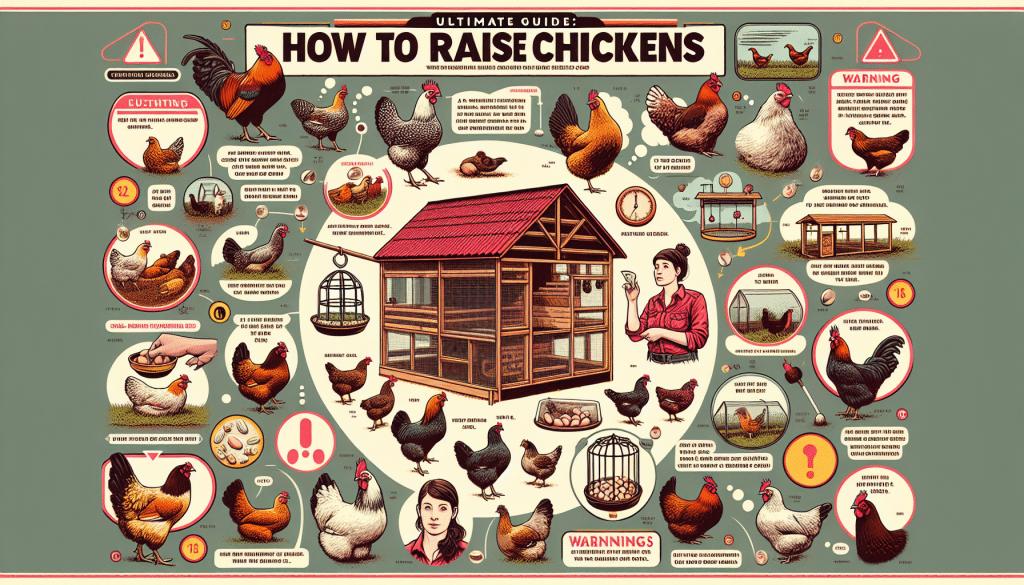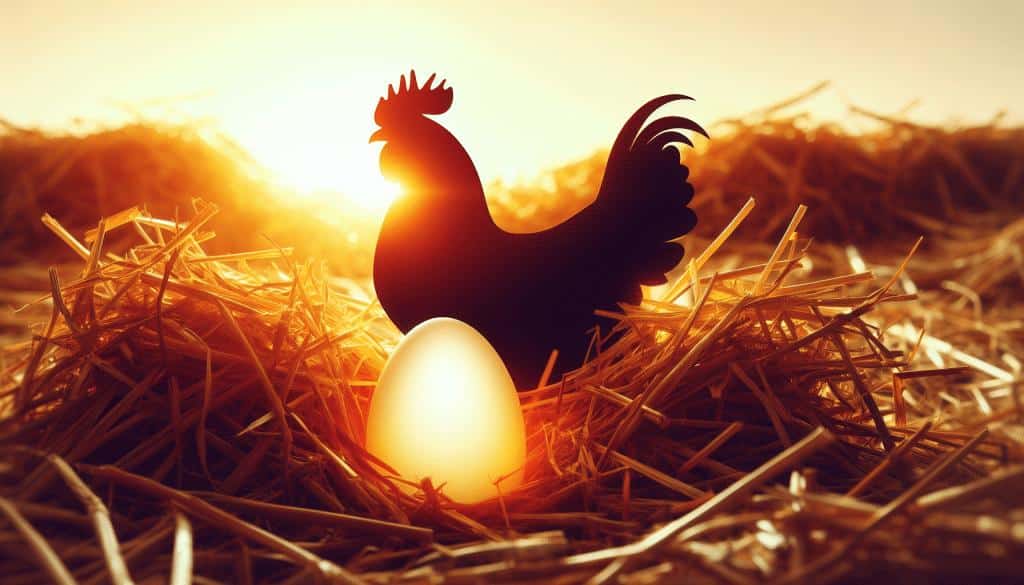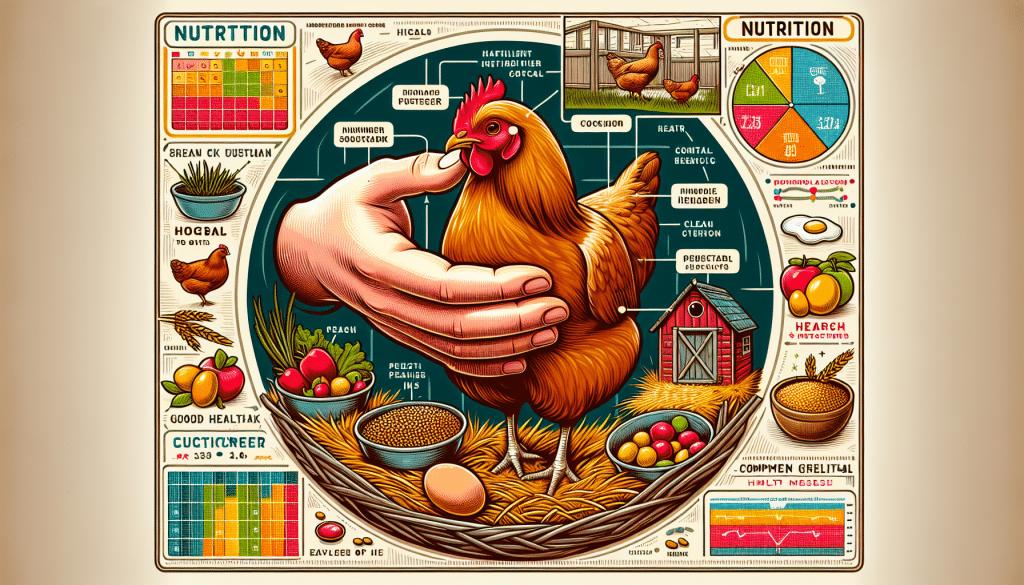So, you’re thinking about delving into the world of backyard chicken raising? Well, you’ve come to the right place! “The Ultimate Guide: How to Raise Chickens” is here to provide you with all the essential information you need to get started on your feathered journey. From choosing the perfect chicken breeds for your needs to setting up a cozy coop, this comprehensive guide covers everything you’ll need to know to successfully raise chickens in your own backyard. Whether you’re a seasoned farmer or a complete newbie, this guide will walk you through the entire process step by step, ensuring that you have all the necessary knowledge and tools to create a happy and healthy home for your feathered friends. So, let’s get started on this clucking adventure!

Understanding the Basics of Raising Chickens
Raising chickens can be a rewarding and fulfilling experience. Whether you’re looking to have a fresh supply of eggs, a sustainable source of meat, or simply enjoy the company of these feathered friends, it’s important to understand the basics of chicken care before diving in. This article will guide you through different types of chickens, the roles and responsibilities of raising them, and weigh the pros and cons of this endeavor.
Different types of chickens
When it comes to raising chickens, there are various types to choose from. Some breeds are known for their egg-laying capabilities, while others are bred specifically for meat production. Dual-purpose breeds offer a combination of both. It’s important to consider your specific goals and needs when selecting the type of chickens to raise. Popular chicken breeds for egg production include the Rhode Island Red, Leghorn, and Australorp, while Cornish Cross and Broilers are popular choices for meat production.
The roles and responsibilities of raising chickens
Raising chickens requires a commitment of time, effort, and resources. As a chicken owner, you will be responsible for providing food and water, ensuring a suitable living environment, and addressing any health concerns that may arise. You will also need to collect eggs, clean the coop, and maintain the overall well-being of your flock. It’s important to understand the level of commitment required before embarking on this endeavor to ensure the welfare of your chickens.
Pros and Cons of raising chickens
Like any endeavor, raising chickens comes with its own set of advantages and disadvantages. On the positive side, chickens can provide a sustainable source of food, both in terms of eggs and meat. They also offer natural pest control, as they enjoy hunting insects and other small pests. Chickens can also be fantastic companions and provide a sense of joy and fulfillment. However, it’s important to acknowledge that chickens require consistent care and attention, including cleaning their living space, addressing health concerns, and managing their overall welfare. Additionally, chickens may attract predators and require appropriate protection.
Choosing the Right Breed and Gender
When it comes to choosing the breed and gender of your chickens, it’s important to consider your specific goals and preferences. Different breeds have distinct characteristics and require varying levels of care.
Choosing between layers and broilers
If your main goal is to have a steady supply of fresh eggs, then layers are the way to go. These breeds are specifically bred for their egg-laying capabilities, and they tend to produce a high number of eggs throughout the year. On the other hand, if you’re more interested in raising chickens for meat, broilers are the ideal choice. These breeds grow quickly and have a high meat-to-bone ratio, making them perfect for meat production.
Considering poultry standards and breed characteristics
When selecting a breed, it’s important to consider the poultry standards set by the American Poultry Association or other relevant organizations. These standards define the desired characteristics and appearance of each breed. It’s also important to research breed-specific traits, such as temperament, hardiness, and adaptability to your specific climate.
Understanding the differences between hens and roosters
Knowing the differences between hens and roosters is essential when it comes to managing your flock. Hens are female chickens that lay eggs, while roosters are male chickens that can fertilize the eggs. Roosters also tend to be more protective of the flock and can exhibit more aggressive behavior. Therefore, it’s important to consider your specific needs and preferences when deciding whether to have roosters in your flock.

Finding Sources to Purchase Chickens
Once you’ve decided on the type and breed of chickens you want to raise, the next step is to find reliable sources to purchase them from. There are several options available for acquiring chickens, each with its own advantages and considerations.
Choosing reliable hatcheries or breeders
One option is to purchase chickens from reputable hatcheries or breeders. These establishments specialize in breeding and raising specific breeds, providing you with healthy and well-cared-for chicks. It’s important to do your research and choose hatcheries or breeders with a good reputation, as this ensures the quality and genetics of the chickens you purchase.
Attending poultry swap meets
Another option is to attend poultry swap meets or livestock auctions. These events bring together poultry enthusiasts and breeders who are looking to buy, sell, or trade chickens. Attending these events can be a great way to see different breeds in person, meet experienced chicken owners, and potentially find unique breeds or varieties that may not be readily available through other sources. However, it’s important to inspect the birds carefully and take precautions to avoid bringing home any diseases or parasites.
Using online poultry marketplaces
Technology has made it easier than ever to connect with chicken breeders and sellers. Online poultry marketplaces provide a convenient way to browse and purchase chickens from the comfort of your own home. These platforms allow you to search for specific breeds, read reviews and ratings, and even have the chickens delivered directly to your doorstep. However, it’s important to exercise caution when purchasing online and verify the reliability and reputation of the sellers.
Housing and Shelters for Chickens
Providing suitable housing and shelters for your chickens is crucial for their well-being and safety. A proper chicken coop, secure housing, and access to a chicken run or yard are essential components of a comfortable and secure environment for your flock.
Choosing the right chicken coop
A chicken coop serves as the primary shelter for your chickens, providing them with protection from predators, extreme weather conditions, and a safe place to roost at night. When choosing a chicken coop, consider factors such as size, ventilation, ease of cleaning, and predator-proofing. The coop should provide enough space for your chickens to move around comfortably and should be designed to accommodate their specific needs, such as nesting boxes for egg-laying.
The importance of secure housing
Ensuring the security of your chicken housing is crucial in protecting your flock from predators. Chicken coops should be constructed with sturdy materials and have secure doors and latches to prevent unauthorized access. Fencing around the coop and chicken run can further deter predators and provide an additional layer of protection. Regular inspections and maintenance are also important to identify and address any potential vulnerabilities or repairs needed.
Essentials for a chicken run or yard
In addition to a chicken coop, chickens also benefit from having access to a chicken run or yard. This outdoor space allows them to exercise, forage for food, and enjoy fresh air and sunlight. A chicken run should be securely fenced to prevent escapes and protect the chickens from predators. Providing shade, dust bathing areas, and perches within the run can also contribute to the overall well-being of your flock.

Nutrition and Feeding Chickens
Proper nutrition is essential for the health and productivity of your chickens. Providing a balanced diet, understanding different feed types, and following feeding guidelines are key aspects of chicken care.
The importance of providing balanced diets
Chickens require a balanced diet to meet their nutritional needs. A balanced diet typically consists of a mixture of grains, protein sources, minerals, and vitamins. Commercially formulated feeds are readily available and often provide a convenient and well-balanced option. However, supplementing with kitchen scraps, garden greens, and insects can also contribute to a varied and nutritious diet.
Understanding different feed types and grades
Feeds for chickens come in different types and grades, each catering to specific stages or purposes. Chick starter feed is typically high in protein and designed for young chicks, while layer feed is formulated to support egg production. There are also feeds available for meat production, such as broiler or meat bird feeds. It’s important to choose feeds that are appropriate for the age and purpose of your chickens to ensure their nutritional requirements are met.
Tips for feeding chickens properly
When feeding your chickens, it’s important to establish a routine and monitor their intake. Provide fresh water at all times and ensure the feed is stored properly to maintain its quality. Feeding times can be determined based on your specific schedule and the needs of your flock. Additionally, monitoring the chickens’ body condition and adjusting their feed as needed can help maintain optimal health and productivity.
Maintaining Chicken Health
Maintaining the health of your chickens is crucial for their well-being and productivity. Being aware of common chicken diseases, practicing preventative measures, and ensuring appropriate vaccinations are key aspects of chicken health care.
Recognizing common chicken diseases
Chickens are susceptible to various diseases, some of which can have serious consequences for their health and productivity. Understanding the signs and symptoms of common chicken diseases, such as respiratory infections, Marek’s disease, or coccidiosis, can help you identify potential issues early and seek appropriate veterinary care. Implementing biosecurity measures, such as regular cleaning and disinfection, can also help prevent the introduction and spread of diseases.
Tips for promoting chicken wellness
Promoting general wellness in your flock can contribute to their overall health and resilience. Providing clean and comfortable living conditions, sufficient space, and proper nutrition are paramount. Regularly monitoring your chickens for signs of illness or distress, such as changes in appetite, behavior, or feather quality, can help you detect potential health issues early on. Additionally, providing opportunities for exercise, dust bathing, and social interaction can contribute to the overall well-being of your chickens.
Essential vaccinations for chickens
Certain vaccinations are crucial for protecting the health of your chickens. Common vaccinations include those for Marek’s disease, Newcastle disease, and infectious bronchitis. Consult with a poultry veterinarian or local extension service to determine which vaccinations are recommended for your specific area and flock. Vaccinations should be administered according to the recommended schedule and in consultation with a professional.
Reproducing and Rearing Chicks
If you’re interested in expanding your flock or hatching chicks, understanding the chicken breeding process, incubation, and caring for chicks is essential.
Understanding the chicken breeding process
Chicken breeding involves the mating of hens and roosters to produce fertile eggs. The rooster fertilizes the eggs during the mating process, and the hens then lay these fertilized eggs. If you’re interested in breeding chickens, it’s important to have a suitable ratio of roosters to hens and to carefully select the breeding pairs to ensure desirable traits are passed on to the offspring.
Incubation and hatching eggs
Once you have fertile eggs, incubation is the next step in the process of hatching chicks. This involves providing controlled conditions, such as temperature and humidity, to mimic the natural incubation process. You can choose to use an incubator or allow a broody hen to sit on and hatch the eggs naturally. Whichever method you choose, it’s important to provide a clean and suitable environment for the developing embryos.
Tips for raising and caring for chicks
Once the chicks have hatched, they require special care and attention. A brooding area should be set up with a heat source, such as a heat lamp or brooder, to maintain the appropriate temperature for the chicks. Providing a suitable brooder box, clean bedding, and access to fresh water and chick starter feed are essential for their growth and development. Regular inspection and monitoring of the chicks’ health, as well as early intervention for any issues that arise, are important to ensure their well-being.
Keeping Chickens for Eggs
For many chicken owners, one of the main motivations for raising chickens is the ability to have fresh, delicious eggs. Managing laying hens and optimizing egg production are crucial aspects of this endeavor.
Managing laying hens
Laying hens require special care to ensure optimal egg production. Providing a stress-free environment, appropriate nutrition, and consistent lighting are key factors in maintaining egg-laying. Laying hens should have access to nesting boxes filled with clean bedding, as well as suitable perches for roosting. Additionally, collecting eggs regularly and providing clean nesting material can help encourage hens to lay in the designated areas.
Understanding egg production
Egg production is influenced by various factors, including breed, age, health, and seasonality. Most chickens begin laying eggs between 4 to 6 months of age and continue to lay for several years. However, egg production may decline as chickens age or during certain times of the year. Understanding these factors can help manage expectations and adjust care practices accordingly.
Hauling and storing chicken eggs
Once the eggs are laid, proper handling and storage are crucial to maintain their quality and freshness. Eggs should be collected regularly, ideally within a few hours after laying. Handle the eggs gently to prevent cracking or contaminating the shells. Storage should be done in a cool and dry place, ideally in temperatures around 45 to 55 degrees Fahrenheit, with the pointed end facing downward. Properly stored eggs can typically be consumed within several weeks.
Raising Chickens for Meat
Raising chickens for meat production involves a different set of considerations compared to raising chickens for egg-laying. Selecting the right breed, feeding and raising practices, and understanding the process of meat processing are key aspects of this endeavor.
Breed selection for meat production
When raising chickens for meat, selecting the right breed is crucial. Broiler chickens, such as Cornish Cross, are specifically bred and genetically selected for fast growth and high meat yield. These breeds can reach market weight in a relatively short time, typically around 6 to 8 weeks. It’s important to choose a breed known for its meat attributes and suitability for your specific production goals.
Feeding and raising broiler chickens
Feeding and raising broiler chickens requires a focus on rapid growth and efficient feed conversion. Broiler feeds with higher protein content are typically used to support the rapid muscle development of these chickens. Providing appropriate space, proper ventilation, and clean living conditions are also important for their overall health and well-being. Monitoring their growth, adjusting feed based on their needs, and providing access to clean water are essential for successful meat production.
Processing chickens for meat
Processing chickens for meat involves the slaughtering, cleaning, and preparation of the birds for consumption. This can be done on-farm or at a local processing facility, depending on your preferences and regulations in your area. It’s important to follow humane and sanitary practices during the processing process to ensure the quality and safety of the meat. Considerations such as scalding, plucking, and evisceration need to be done carefully and hygienically.
Legal Considerations and Ethical Concerns for Raising Chickens
Before embarking on the journey of raising chickens, it’s important to be aware of any legal considerations, as well as ethical concerns related to chicken welfare and environmental impact.
Understanding local ordinances and restrictions
Different areas may have specific ordinances and restrictions pertaining to raising chickens. These regulations may cover aspects such as flock size, coop placement, noise control, and waste management. It’s essential to research and understand the local laws and requirements to ensure compliance and avoid any potential issues with neighbors or authorities.
Considering animal welfare and ethical issues
Raising chickens ethically involves providing appropriate living conditions, respecting their natural behavior, and ensuring their overall well-being. This includes providing sufficient space, clean and comfortable housing, appropriate nutrition, and access to fresh air and sunlight. Being attentive to their health needs, offering opportunities for exercise and social interaction, and minimizing stress or discomfort are key aspects of ethical chicken care.
Managing environmental impact and sustainability issues
Raising chickens can have an environmental impact, particularly in terms of waste management and resource usage. Proper handling and disposal of chicken waste, such as manure, is crucial to prevent environmental contamination. Additionally, implementing sustainable practices, such as composting and utilizing organic feed options, can help reduce the environmental footprint of chicken raising.
In conclusion, understanding the basics of raising chickens is essential for a successful and fulfilling experience. From choosing the right breed and gender to providing suitable housing, nutrition, and healthcare, each aspect contributes to the overall welfare and productivity of your flock. Whether you’re raising chickens for eggs, meat, or companionship, responsible and ethical practices will ensure the well-being of your chickens and create a positive experience for both you and your feathered friends.



